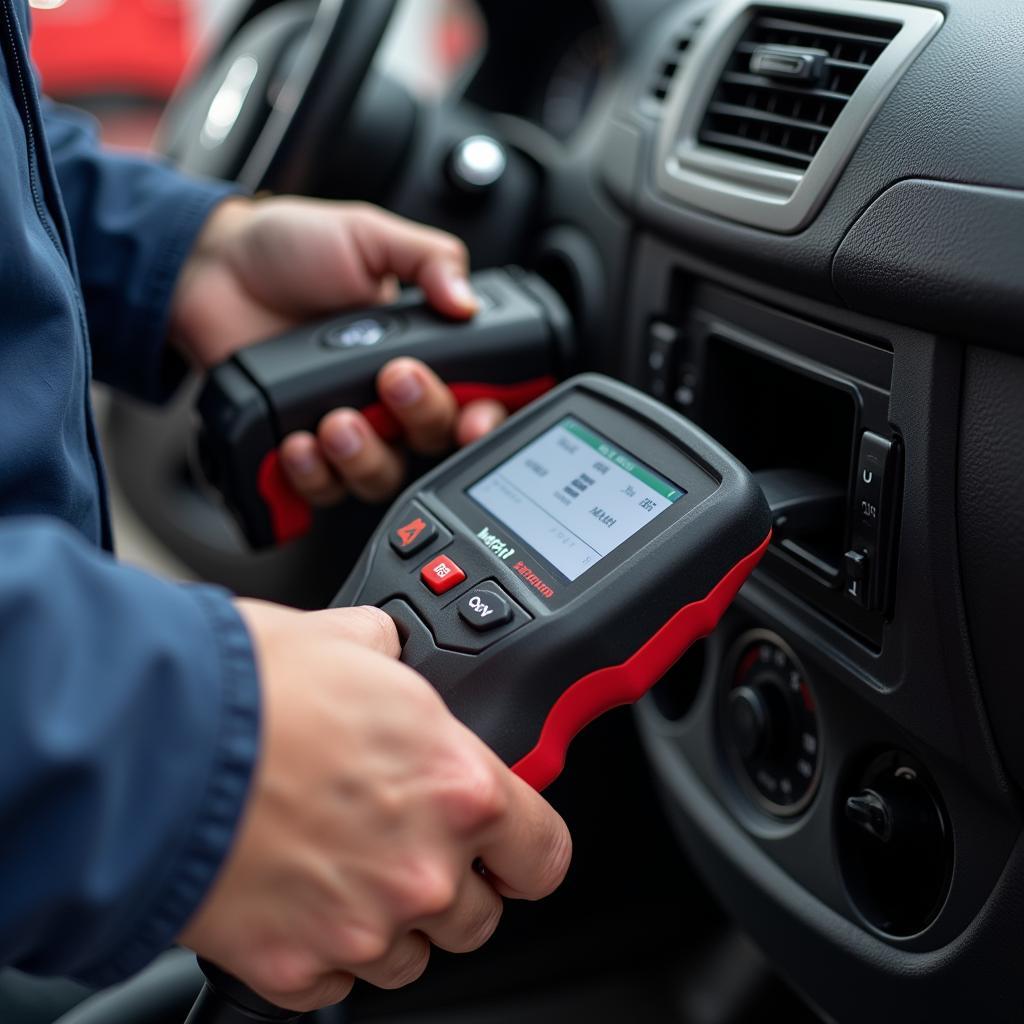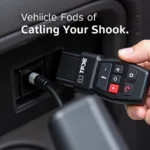A body scan tool is an essential piece of equipment for any mechanic or car enthusiast. It allows you to communicate with your vehicle’s computer system, read and clear fault codes, and access live data from various sensors. In this comprehensive guide, we will delve into the world of body scan tools, exploring their functionalities, benefits, and how to choose the right one for your needs.
Understanding the Role of a Body Scan Tool
Gone are the days of relying solely on mechanical know-how to diagnose car problems. Today’s vehicles are complex machines controlled by sophisticated computer systems. A body scan tool acts as the bridge between you and these systems, enabling you to:
- Retrieve Diagnostic Trouble Codes (DTCs): When your car experiences an issue, the onboard computer system generates DTCs. A body scan tool reads these codes, providing valuable insights into the nature and location of the problem.
- Clear Fault Codes: After repairing a fault, a body scan tool can erase the corresponding DTCs, ensuring your car’s computer system is reset and functioning correctly.
- Access Live Data Streams: Monitor real-time data from various sensors throughout your vehicle, including engine speed, coolant temperature, oxygen sensor readings, and more. This information helps pinpoint problems and analyze performance.
- Perform Actuator Tests: Activate specific components like fuel injectors, solenoids, or windows to verify their functionality and diagnose potential issues.
- Program and Configure Modules: Some advanced body scan tools allow for programming and configuration of certain vehicle modules, like key fobs or control units.
 Mechanic using a body scan tool to diagnose a car
Mechanic using a body scan tool to diagnose a car
Types of Body Scan Tools
Body scan tools come in various forms, each catering to different user groups and needs:
- Code Readers: These entry-level tools primarily focus on reading and clearing DTCs. They are ideal for DIY enthusiasts looking for a basic understanding of their vehicle’s health.
- OBD-II Scanners: More advanced than code readers, OBD-II scanners offer additional functionalities like live data streaming and access to manufacturer-specific codes.
- Professional-Grade Scan Tools: These comprehensive tools are designed for professional mechanics and offer a wide range of advanced features, including bidirectional communication, module programming, and access to extensive diagnostic databases.
Choosing the Right Body Scan Tool
Selecting the appropriate body scan tool depends on your specific requirements and budget. Consider the following factors:
- Vehicle Compatibility: Ensure the tool you choose is compatible with your vehicle’s make, model, and year. Some tools specialize in certain car manufacturers, while others offer broader compatibility.
- Functionality: Determine the features that are essential for your needs. Do you require basic code reading and clearing, or are you looking for more advanced functionalities like live data and module programming?
- User Interface: Opt for a tool with an intuitive and user-friendly interface, especially if you are new to automotive diagnostics. Look for clear displays, easy navigation, and helpful features like built-in troubleshooting guides.
Benefits of Using a Body Scan Tool
Investing in a quality body scan tool offers numerous benefits:
- Accurate Diagnosis: Quickly and accurately identify the root cause of car problems, saving time and money on unnecessary repairs.
- Preventative Maintenance: Regularly monitor your vehicle’s health and catch potential issues early on, preventing costly breakdowns.
- Enhanced Understanding: Gain a deeper understanding of your vehicle’s inner workings and how different systems interact.
- Cost Savings: Avoid expensive trips to the mechanic for simple diagnostics and repairs, allowing you to take control of your vehicle’s maintenance.
Body Scan Tools for Specific Needs
- Body Shop Scan Tools: These tools specialize in diagnosing and repairing issues related to a vehicle’s body control module, airbags, and other related systems.
- 1991 Nissan D21 Hardbody Scan Tool: If you own a classic 1991 Nissan D21 Hardbody, a dedicated scan tool can help you diagnose and repair any issues specific to this model.
Conclusion
A body scan tool is an invaluable asset for anyone looking to understand, maintain, and repair their vehicle. By providing access to your car’s computer system, these tools empower you to diagnose problems accurately, perform preventative maintenance, and save money on repairs. When choosing a body scan tool, consider your specific needs, budget, and vehicle compatibility to make an informed decision.
FAQs
Q: Are body scan tools compatible with all car makes and models?
A: No, compatibility varies depending on the tool and the vehicle. Ensure the tool you choose is compatible with your car’s make, model, and year.
Q: Can I use a body scan tool to program a new key fob?
A: Some advanced body scan tools offer module programming capabilities, including key fob programming. However, this feature is not available in all tools.
Q: What is the difference between a code reader and an OBD-II scanner?
A: Code readers primarily focus on reading and clearing DTCs. OBD-II scanners offer additional functionalities like live data streaming and access to manufacturer-specific codes.
Q: How often should I use a body scan tool on my car?
A: It’s recommended to use a body scan tool for periodic checks, especially if you notice any unusual behavior or warning lights on your dashboard.
Do you need help choosing the right body scan tool? Contact us via WhatsApp: +1(641)206-8880, Email: cardiagtechworkshop@gmail.com, or visit us at 276 Reock St, City of Orange, NJ 07050, United States. Our team is available 24/7 to assist you. You can also find more information on related topics on our website, such as bluetooth scan tool with abs srs body module with bidirectional and scan tool body chassis codes.


